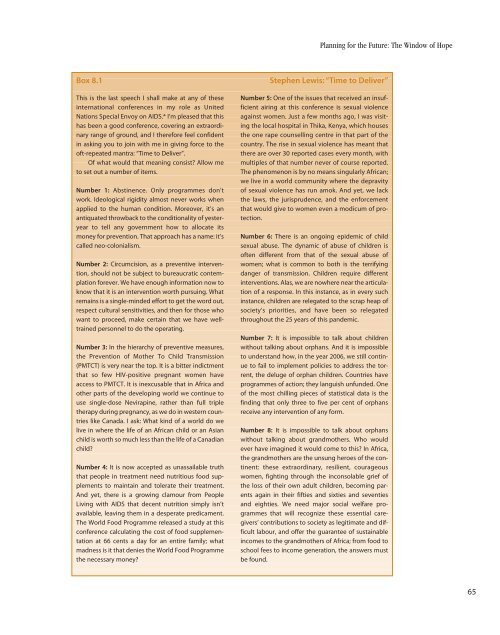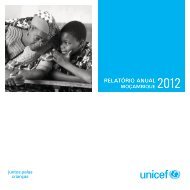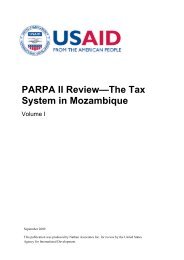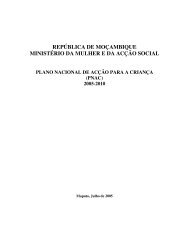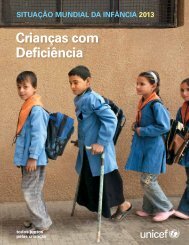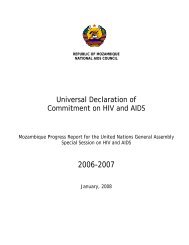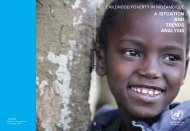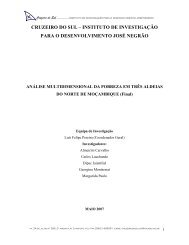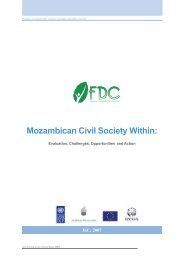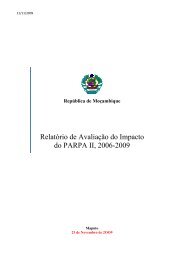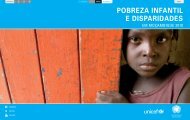English language version - Human Development Reports - United ...
English language version - Human Development Reports - United ...
English language version - Human Development Reports - United ...
- No tags were found...
Create successful ePaper yourself
Turn your PDF publications into a flip-book with our unique Google optimized e-Paper software.
Planning for the Future: The Window of HopeBox 8.1This is the last speech I shall make at any of theseinternational conferences in my role as <strong>United</strong>Nations Special Envoy on AIDS.* I’m pleased that thishas been a good conference, covering an extraordinaryrange of ground, and I therefore feel confidentin asking you to join with me in giving force to theoft-repeated mantra: “Time to Deliver”.Of what would that meaning consist? Allow meto set out a number of items.Number 1: Abstinence. Only programmes don’twork. Ideological rigidity almost never works whenapplied to the human condition. Moreover, it’s anantiquated throwback to the conditionality of yesteryearto tell any government how to allocate itsmoney for prevention. That approach has a name: it’scalled neo-colonialism.Number 2: Circumcision, as a preventive intervention,should not be subject to bureaucratic contemplationforever. We have enough information now toknow that it is an intervention worth pursuing. Whatremains is a single-minded effort to get the word out,respect cultural sensitivities, and then for those whowant to proceed, make certain that we have welltrainedpersonnel to do the operating.Number 3: In the hierarchy of preventive measures,the Prevention of Mother To Child Transmission(PMTCT) is very near the top. It is a bitter indictmentthat so few HIV-positive pregnant women haveaccess to PMTCT. It is inexcusable that in Africa andother parts of the developing world we continue touse single-dose Nevirapine, rather than full tripletherapy during pregnancy, as we do in western countrieslike Canada. I ask: What kind of a world do welive in where the life of an African child or an Asianchild is worth so much less than the life of a Canadianchild?Number 4: It is now accepted as unassailable truththat people in treatment need nutritious food supplementsto maintain and tolerate their treatment.And yet, there is a growing clamour from PeopleLiving with AIDS that decent nutrition simply isn’tavailable, leaving them in a desperate predicament.The World Food Programme released a study at thisconference calculating the cost of food supplementationat 66 cents a day for an entire family; whatmadness is it that denies the World Food Programmethe necessary money?Stephen Lewis: “Time to Deliver”Number 5: One of the issues that received an insufficientairing at this conference is sexual violenceagainst women. Just a few months ago, I was visitingthe local hospital in Thika, Kenya, which housesthe one rape counselling centre in that part of thecountry. The rise in sexual violence has meant thatthere are over 30 reported cases every month, withmultiples of that number never of course reported.The phenomenon is by no means singularly African;we live in a world community where the depravityof sexual violence has run amok. And yet, we lackthe laws, the jurisprudence, and the enforcementthat would give to women even a modicum of protection.Number 6: There is an ongoing epidemic of childsexual abuse. The dynamic of abuse of children isoften different from that of the sexual abuse ofwomen; what is common to both is the terrifyingdanger of transmission. Children require differentinterventions. Alas, we are nowhere near the articulationof a response. In this instance, as in every suchinstance, children are relegated to the scrap heap ofsociety’s priorities, and have been so relegatedthroughout the 25 years of this pandemic.Number 7: It is impossible to talk about childrenwithout talking about orphans. And it is impossibleto understand how, in the year 2006, we still continueto fail to implement policies to address the torrent,the deluge of orphan children. Countries haveprogrammes of action; they languish unfunded. Oneof the most chilling pieces of statistical data is thefinding that only three to five per cent of orphansreceive any intervention of any form.Number 8: It is impossible to talk about orphanswithout talking about grandmothers. Who wouldever have imagined it would come to this? In Africa,the grandmothers are the unsung heroes of the continent:these extraordinary, resilient, courageouswomen, fighting through the inconsolable grief ofthe loss of their own adult children, becoming parentsagain in their fifties and sixties and seventiesand eighties. We need major social welfare programmesthat will recognize these essential caregivers’contributions to society as legitimate and difficultlabour, and offer the guarantee of sustainableincomes to the grandmothers of Africa; from food toschool fees to income generation, the answers mustbe found.65


